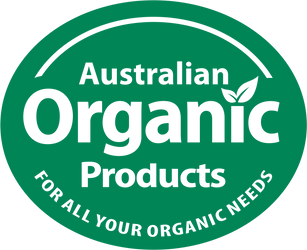Reduce the risk of cancer
On average organic foods contain about one-third more cancer fighting antioxidants than comparable conventional produce (Benbrook, 2005).
Avoid GMO’s
Independent testing of the long-term health effects of GMO foods on humans has not been carried out. The many exemptions from GE labeling laws in Australia make it impossible to know which grocery items use GMO- derived ingredients. Certified organic foods are a great way to avoid GMO’s (Australian Organic 2009).
Reduce chemical runoff and residues in drinking water and waterways
Over 29,500 tonnes of herbicides, insecticides, fungicides and plant growth regulators are used each year in Australia (Australian Government Department of Sustainability & Environment, Water Population and Communities, 2006). Sediment, nutrients and pesticides leaving agricultural land and draining into the reef lagoon remain the largest contributors to elevated pollutant levels (Reef water quality protection plan 2013).
Increase biodiversity and save disappearing native animal habitats
Organic farming significantly supports biodiversity. It has been suggested that organic farming practices, which exclude the use of synthetic pesticides and fertilizers are beneficial for biodiversity. On average, organisms were between 30 - 50% more abundant in organic farming systems versus conventional farming methods (Journal of Applied Ecology 2005, 42, 261–269; Bengtsson, Ahnstrom & Weibull, 2005).
Health, caring for nature, the environment and taste
The most significant motivations for buying organic products in the UK are health, caring for nature and the environment and taste . More than half of organic shoppers cite healthy eating (55%) and avoiding chemical residues (53%) as reasons to purchase. Nearly half are motivated by care for the environment and nature (44%), while around a third mention the taste of organic food (35%) and animal welfare (31%) (Soil Association Organic Market Report, 2013).
Safeguard the integrity of food
Certified organic provides a guarantee that product has been grown, handled, packaged and distributed avoiding risk of contamination of the product to the point of sale.
Reduce greenhouse gas emissions by eliminating synthetic nitrogen fertilisers
Agriculture in Australia is the second-highest contributor of greenhouse gases (15.2% in 2008) and accounts for most of the country’s methane and nitrous oxide emissions, which are caused by fertilisers and crop residues (Department of Climate Change 2010). Organic standards prohibit the use of nitrogen fertilisers, which lowers emissions and provides both economic and environmental benefits (Department of Agriculture, Fisheries and Forestry, 2011).
Reduce hormone disruptors caused by pesticides
The European Union says that hormones such as chemical insecticides and herbicides used commonly in food production can interfere with our body’s natural hormones and reproductive organs, which may cause low sperm counts and increase the risk of cancer (Orton et al, 2011) and may cause early onset of puberty among young girls (European Commission, 2007).
